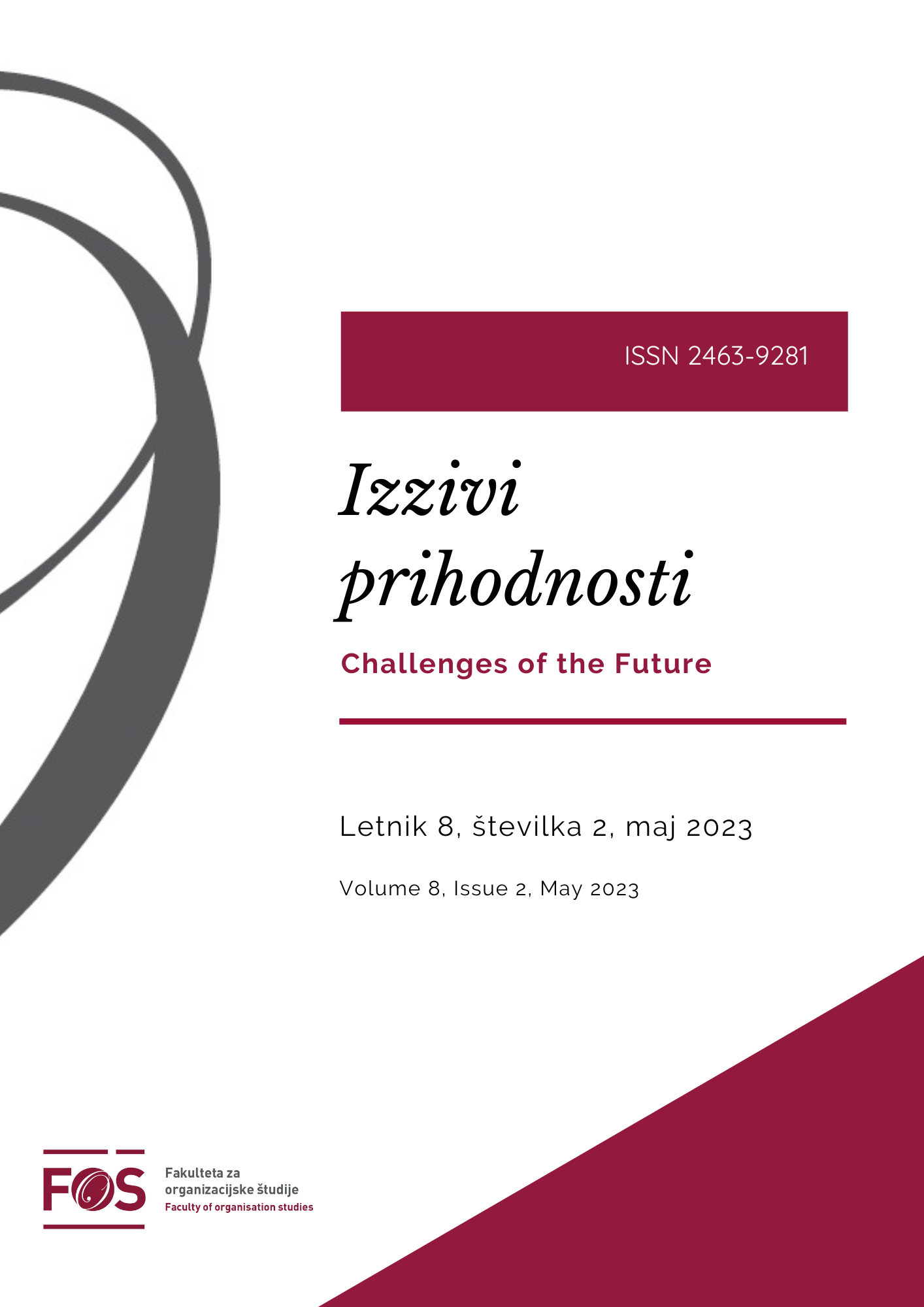The Concept of Identifying Factors of Quiet Quitting in Organizations: An Integrative Literature Review
DOI:
https://doi.org/10.37886/ip.2023.006Keywords:
quiet quitting, employees, organization, employee retention, covid-19 pandemic, workplace, working environment, human resources management.Abstract
Research Question (RQ): Which factors have a significant impact on the concept of quiet quitting in organizations?
Purpose: The purpose of the integrative literature review is to examine in more detail the concept of quiet quitting in organizations. The objective of the comprehensive review is to identify the dimensions of the concept and to identify the factors influencing it, based on the relevant literature.
Method: The primary research methodology is based on an integrative literature review. Data collection followed the guidelines dictated by the established formal procedure or standard PRISMA. The main tool for retrieving relevant literature for our study is the prepared matrix of research databases and the keywords used in the search. Literature was searched in SpringerLink, Scopus, ProQuest, ScienceDirect, Cobiss, dLib, Google Scholar, Emerald, and ResearchGate databases. We defined the timeframe of the search as 2019 to 2023. We excluded literature that is not directly relevant to our field of research and does not have open access. We analyzed the collected data using the meta-synthesis method.
Results: Among the factors that have a significant impact on the concept of quiet quitting, we identified: poorly valued employees, lack of organizational commitment to employee career development, disengagement of employees, exclusion of employees in organizational decisions, lack of autonomy at work, and a decline in trust in the organization. It follows that identifying the needs of employees is a key concept on which to build strategies that lead to successful and effective management of quiet quitting.
Organization: Our research provides insights into the dimension of the concept and illustrates the influencing factors that enable organizations to identify the concept in their midst in a timely and successful manner.
Society: The potential reduction in the contribution of individuals to the economy has a negative impact on the economy and society as a whole.
Originality: The topic is under-researched and we consider that further in-depth research is needed.
Limitations / further research: There is a perception that the topic is being studied, but at the same time, it is noted that this is not being followed up by scientific research. Original articles were included in the analysis and all non-open-access literature was excluded. The integrative review prepared allows for further in-depth research in this area and forms the basis for elaborating a Ph.D. thesis.
References
Ali, S. (2022). Evaluating the effect of covid-19 on mid-level 1 evaluating the effect of covid-19 on mid-level college administrators’ roles at four-year private institutions in new jersey. (Doctoral thesis). Caulfield School of Education: Saint Peter’s University.
Andrulli, R., & Gerards, R. (2023). How new ways of working during COVID-19 affect employee well-being via technostress, need for recovery, and work engagement. Computers in Human Behavior, 139, 107560. https://doi.org/10.1016/J.CHB.2022.107560.
Aydin, E. & Azizoğlu, Ö. (2022). A New term for an existing concept: quiet quitting-a self- determination perspective. International Congress on Critical Debates in Social Sciences.
Bell, R. & Kennebrew, D. (2023). What Does Jean-Jacques Rousseau and Chester I. Barnard Have to Do With Quiet Quitting? American Journal of Management, 23(1)2023. doi: 10.33423/ajm.v23i1.5869
Boy, Y., & Sürmeli, M. (2023). Quiet quitting: A significant risk for global healthcare. Journal of Global Health, 13, 03014. https://doi.org/10.7189/JOGH.13.03014
Cao, J., & Hamori, M. (2022). Adapting careers to the Covid crisis: The impact of the pandemic on employees’ career orientations. Journal of Vocational Behavior, 139. https://doi.org/10.1016/J.JVB.2022.103789
Chugh, A. (2021, March 23). What is The Great Resignation and what can we learn from it. Retrieved from https://www.weforum.org/agenda/2021/11/what-is-the-great-resignation-and-what-can-we-learn-from-it/
Cieniewicz, A. (2023). Commitment Profiles of Federal Government Employees Who Telework: A Qualitative Study Associate Professor of Human and Organizational Learning. (Doctoral thesis). The Graduate School of Education and Human Development of The George Washington University.
Engelmann, J. N. (2022). The Concept of Humble Leadership to Strengthen Employee Performance during the Covid-19 pandemic in an International Corporation in Germany (Doctoral thesis). The Adrian Dominican School of Education of Barry University.
Formica, S., & Sfodera, F. (2022). The Great Resignation and Quiet Quitting paradigm shifts: An overview of current situation and future research directions. Journal of Hospitality Marketing and Management, 31(8), 899–907. https://doi.org/10.1080/19368623.2022.2136601
Harter, J. (2022, March 16). Is Quiet Quitting Real? Retrieved from https://www.gallup.com/workplace/398306/quiet-quitting-real.aspx
Harvey, S. (2023). Qualitative case study on the relationship between workloads and the impact it has on employee job satisfaction (Doctoral thesis). Glen R. Jones College of Business of Trident University International
Hickok, M. (2022, March 2022). Employee Monitoring is Not a Solution for Quiet Quitting. Google Retrieved from https://drive.google.com/file/d/1Qvnb4XuUxdbgtfpaqaZmVDIjaoPzsR10/view
Hofschulte-Beck, A. (2022). The Long-Term Impacts of Remote Working on Employees and Employers. (Doctoral thesis). The College of St. Scholastica, Duluth, MN.
Klotz, A. & Bolino, M. (2022, March 23). When Quiet Quitting Is Worse Than the Real Thing. Retrieved from https://hbr.org/2022/09/when-quiet-quitting-is-worse-than-the-real-thing
Liu-Lastres, B., Wen, H., & Huang, W. J. (2022). A reflection on the Great Resignation in the hospitality and tourism industry. International Journal of Contemporary Hospitality Management, 35(1), 235–249. https://doi.org/10.1108/IJCHM-05-2022-0551/FULL/PDF
Luchs, C. (2023). Instructional Design: A Workforce Perspective for 2023. TechTrends, 67(1), 4–6. https://doi.org/10.1007/S11528-022-00818-6/METRICS
Mahand, T. & Caldwell, C. (2023). Quiet Quitting – Causes and Opportunities. Business and Management Research, 12(1), 9. https://doi.org/10.5430/bmr.v12n1p9
Marsh, E., Vallejos, E. P., & Spence, A. (2022). The digital workplace and its dark side: An integrative review. Computers in Human Behavior, 128, 107118. https://doi.org/10.1016/J.CHB.2021.107118
Morrison-Beedy, D. (2022). Editorial: Are We Addressing “Quiet Quitting” in Faculty, Staff, and Students in Academic Settings? Building Healthy Academic Communities Journal, 6(2), 7–8. https://doi.org/10.18061/BHAC.V6I2.9309
Na-Nan, K., Kanthong, S., & Joungtrakul, J. (2021). An Empirical Study on the Model of Self-Efficacy and Organizational Citizenship Behavior Transmitted through Employee Engagement, Organizational Commitment and Job Satisfaction in the Thai Automobile Parts Manufacturing Industry. Journal of Open Innovation: Technology, Market, and Complexity, 7(3), 170. https://doi.org/10.3390/JOITMC7030170
Narayanamurthy, G., & Tortorella, G. (2021). Impact of COVID-19 outbreak on employee performance – Moderating role of industry 4.0 base technologies. International Journal of Production Economics, 234, 108075. https://doi.org/10.1016/J.IJPE.2021.108075
Ng, E., & Stanton, P. (2023). Editorial: The great resignation: managing people in a post COVID-19 pandemic world. Personnel Review, 52(2), 401–407. https://doi.org/10.1108/pr-03-2023-914
Ninaus, K., Diehl, S., & Terlutter, R. (2021). Employee perceptions of information and communication technologies in work life, perceived burnout, job satisfaction and the role of work-family balance. Journal of Business Research, 136, 652–666. https://doi.org/10.1016/J.JBUSRES.2021.08.007
Patel, P. C., & Rietveld, C. A. (2023). Right of association and new business entry: country-level evidence from the market sector. Small Business Economics, 1–17. https://doi.org/10.1007/S11187-022-00727-1/TABLES/4
Pronk, N. P. (2022). Addressing COVID-19 Disruptions at the Workplace While Preparing for a Postpandemic Future. ACSM’s Health and Fitness Journal, 26(3), 52–55. https://doi.org/10.1249/FIT.0000000000000764
Rameshkumar, M. (2020). Employee engagement as an antecedent of organizational commitment – A study on Indian seafaring officers. Asian Journal of Shipping and Logistics, 36(3), 105–112. https://doi.org/10.1016/J.AJSL.2019.11.003
Ratnatunga, J. (2022, March 16). Quiet Quitting: The Silent Challenge of Performance Management. Retrieved from https://www.researchgate.net/publication/368273479_Quiet_Quitting_The_Silent_Challenge_of_Performance_Management
Rock, D. & Dixit, J. (2022, March 22). Are Our Brains Wired to Quiet Quit? Retrieved from https://hbr.org/2023/01/are-our-brains-wired-to-quiet-quit.
Serenko, A. (2023). The human capital management perspective on quiet quitting: recommendations for employees, managers, and national policymakers. Journal of Knowledge Management. https://doi.org/10.1108/JKM-10-2022-0792
Shafiq, B., Aburub, H., & Aburub, B. S. (2020). Employee Retention & Engagement Solution. Open Journal of Business and Management, 8(6), 2805–2837. https://doi.org/10.4236/OJBM.2020.86173
Telford, T. (2022, March 15) This is what quiet quitting really looks like. Retrieved from https://www.washingtonpost.com/business/2022/08/21/quiet-quitting-what-to-know/
Wilkinson, L. (2022). Adapting to Meet the Challenges of Post-Pandemic Employee Engagement. (Doctoral thesis). The College of St. Scholastica, Duluth, MN
Additional Files
Published
How to Cite
Issue
Section
License
Copyright (c) 2023 Nastja Pevec

This work is licensed under a Creative Commons Attribution-ShareAlike 4.0 International License.
![]()








